Postdoctoral Fellows
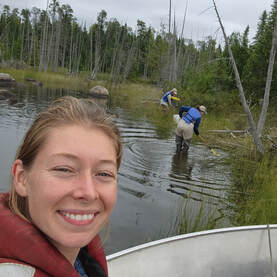
Dr. Stephanie Graves (2023-2025)
MSc, University of New Brunswick
PhD, University of Saskatchewan
Contact: gravess(a)mcmaster.ca
MSc, University of New Brunswick
PhD, University of Saskatchewan
Contact: gravess(a)mcmaster.ca
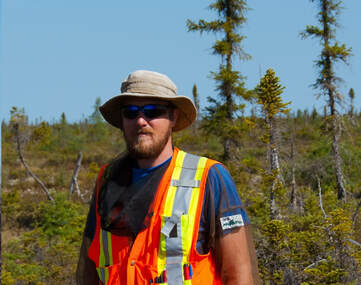
Dr. Colin McCarter (2020-2022)
MSc, University of Waterloo
PhD, University of Waterloo
Current contact: colinmcc(a)nipissingu.ca
My research interests lie in the reactive transport of metals, pollutants, nutrients, and carbon under changing environmental and climatic conditions. I am currently exploring how the climate change enhanced burning of peatlands increases toxic metal mobility and subsequent changes to bioavailability, and how to mitigate these risks through active restoration activities.
MSc, University of Waterloo
PhD, University of Waterloo
Current contact: colinmcc(a)nipissingu.ca
My research interests lie in the reactive transport of metals, pollutants, nutrients, and carbon under changing environmental and climatic conditions. I am currently exploring how the climate change enhanced burning of peatlands increases toxic metal mobility and subsequent changes to bioavailability, and how to mitigate these risks through active restoration activities.
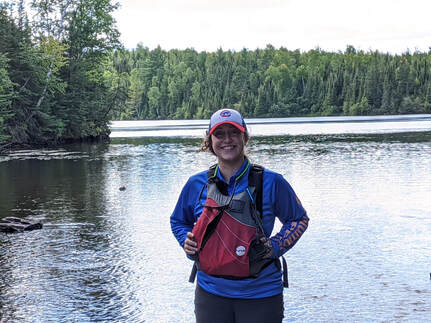
Dr. Brittany Perrotta (2021-2022)
BSc Integrative Biology, University of Illinois Urbana-Champaign
PhD Biology, Baylor University
Current contact: bperrotta(a)usgs.gov
My research interests are at the intersection of aquatic ecology and environmental toxicology. I'm broadly interested in understanding how organisms, community assemblages (from microbial to macroinvertebrate), and ecosystems respond to anthropogenic stressors including emerging/legacy contaminants and nutrient pollution. In collaboration with USGS Columbia Environmental Research Center, I am assessing the microbiomes of insects and spiders from PCB and metal contaminated sites across the land-water interface.
BSc Integrative Biology, University of Illinois Urbana-Champaign
PhD Biology, Baylor University
Current contact: bperrotta(a)usgs.gov
My research interests are at the intersection of aquatic ecology and environmental toxicology. I'm broadly interested in understanding how organisms, community assemblages (from microbial to macroinvertebrate), and ecosystems respond to anthropogenic stressors including emerging/legacy contaminants and nutrient pollution. In collaboration with USGS Columbia Environmental Research Center, I am assessing the microbiomes of insects and spiders from PCB and metal contaminated sites across the land-water interface.
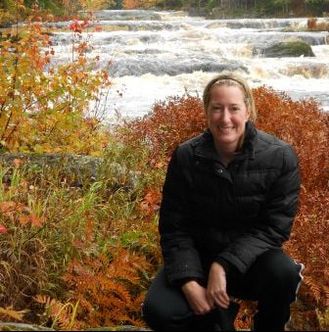
Dr. Jennifer Thera (2017-2018)
MSc Environmental Science, Florida Gulf Coast University
BSc Marine Science, Eckerd College
PhD Biology, University of New Brunswick
Research: “Understanding among-lake variability in mercury and amino acids in aquatic food webs”
In collaboration with Parks Canada, I am assessing long-term changes in mercury (Hg) in fish from Kejimkujik National Park in Nova Scotia. This region is a biological Hg hotspot and Common loons and yellow perch in these lakes are among the highest in Hg in northeastern North America. I am also working with NIVA in Oslo to develop new models for assessing methyl Hg in aquatic invertebrates in Scandanavian lakes (funding Norwegian Environment Agency).
MSc Environmental Science, Florida Gulf Coast University
BSc Marine Science, Eckerd College
PhD Biology, University of New Brunswick
Research: “Understanding among-lake variability in mercury and amino acids in aquatic food webs”
In collaboration with Parks Canada, I am assessing long-term changes in mercury (Hg) in fish from Kejimkujik National Park in Nova Scotia. This region is a biological Hg hotspot and Common loons and yellow perch in these lakes are among the highest in Hg in northeastern North America. I am also working with NIVA in Oslo to develop new models for assessing methyl Hg in aquatic invertebrates in Scandanavian lakes (funding Norwegian Environment Agency).
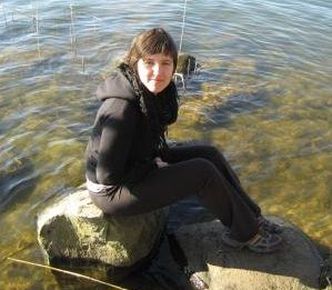
Dr. Maitane Erdozain (2017-2020)
BSc Biology, University of Basque Country (Spain)
MSc Sustainable Water Management, University of Kristianstad (Sweden)
PhD Biology, University of New Brunswick
Research: “Cumulative effects of forest harvesting on rivers in northern New Brunswick”
I am collaborating with researchers at the University of New Brunswick and the Canadian Forest Service to understand how different forest management practices affect the health of rivers. My research is using a suite of biological (macroinvertebrate communities, food web structure) and abiotic (water quality, dissolved organic matter quality) endpoints to assess whether there are cumulative impacts of intensive and extensive forest management on rivers. This research is supported by NSERC and JD Irving, Ltd.
BSc Biology, University of Basque Country (Spain)
MSc Sustainable Water Management, University of Kristianstad (Sweden)
PhD Biology, University of New Brunswick
Research: “Cumulative effects of forest harvesting on rivers in northern New Brunswick”
I am collaborating with researchers at the University of New Brunswick and the Canadian Forest Service to understand how different forest management practices affect the health of rivers. My research is using a suite of biological (macroinvertebrate communities, food web structure) and abiotic (water quality, dissolved organic matter quality) endpoints to assess whether there are cumulative impacts of intensive and extensive forest management on rivers. This research is supported by NSERC and JD Irving, Ltd.

Dr. Jennifer Loughery (2017-18)
BSc Biology, University of New Brunswick
MSc Biology, University of New Brunswick
PhD Biology, University of New Brunswick
Research: "Assessing the fate of contaminants in the Saint John River system"
I am assessing contaminant levels upstream and downstream of the Mactaquac dam and in the Saint John Harbour as part of large, collaborative projects to understand the potential risks sediment-bound and biomagnifying contaminants have on invertebrate and fish communities and fish consumers in the region. This research is supported by NSERC, NB Power, the Canadian Water Network and the Saint John Port Authority.
BSc Biology, University of New Brunswick
MSc Biology, University of New Brunswick
PhD Biology, University of New Brunswick
Research: "Assessing the fate of contaminants in the Saint John River system"
I am assessing contaminant levels upstream and downstream of the Mactaquac dam and in the Saint John Harbour as part of large, collaborative projects to understand the potential risks sediment-bound and biomagnifying contaminants have on invertebrate and fish communities and fish consumers in the region. This research is supported by NSERC, NB Power, the Canadian Water Network and the Saint John Port Authority.
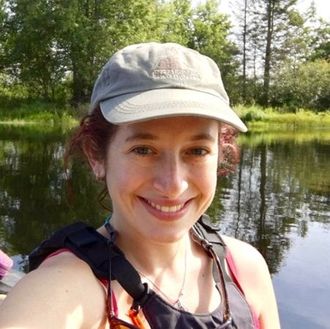
Dr. Lindsay Brin (2016-17)
BA Swarthmore College
MA Boston University
PhD Brown University
Research: “Predicting ecosystem disturbance status from stream invertebrate community structure”
I am an ecosystem ecologist who is interested in the intersection of humans and the environment, and what happens when the environment changes, whether due to natural cycles, climate change, or other anthropogenic disturbances. My research focus has generally been on biogeochemical cycling and microbial ecology in soils and sediments. This postdoctoral work is supported by the NSERC Collaborative Research and Training Experience (CREATE)-funded Watershed and Aquatics Training in Environmental Research (WATER) program at the Canadian Rivers Institute.
For more information about my scientific research and my experience teaching coding skills, please see my website: Lauren Negrazis, McMaster University, "Cumulative impacts of forest management on the accumulation and biomagnification of mercury and its relationship to autochthony in stream food webs in New Brunswick, Canada." 2021. /.
BA Swarthmore College
MA Boston University
PhD Brown University
Research: “Predicting ecosystem disturbance status from stream invertebrate community structure”
I am an ecosystem ecologist who is interested in the intersection of humans and the environment, and what happens when the environment changes, whether due to natural cycles, climate change, or other anthropogenic disturbances. My research focus has generally been on biogeochemical cycling and microbial ecology in soils and sediments. This postdoctoral work is supported by the NSERC Collaborative Research and Training Experience (CREATE)-funded Watershed and Aquatics Training in Environmental Research (WATER) program at the Canadian Rivers Institute.
For more information about my scientific research and my experience teaching coding skills, please see my website: Lauren Negrazis, McMaster University, "Cumulative impacts of forest management on the accumulation and biomagnification of mercury and its relationship to autochthony in stream food webs in New Brunswick, Canada." 2021. /.
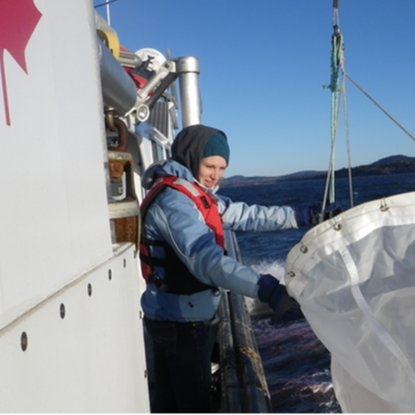
Dr. Jordana Van Geest (2012-14)
BSc University of Waterloo
PhD University of Guelph
Research: “Effects of anti-sea lice pesticides used in salmon aquaculture on non-target organisms”
A variety of pesticides have been used in aquaculture to control infestations of sea lice, which are ecotoparasites of Atlantic salmon that can significantly affect fish health. The pesticides are applied as a bath treatment to the fish and subsequently released into the surrounding environment, where native, non-target organisms could be exposed to these chemicals.
My research, in collaboration with Fisheries and Oceans Canada, involves laboratory testing to determine the effects of several anti-sea lice pesticides on native zooplankton and the effects of those pesticides that are pyrethroid-based and may accumulate in sediment on benthic organisms, including ecologically-sensitive amphipods and commercially-important polychaete worms.
BSc University of Waterloo
PhD University of Guelph
Research: “Effects of anti-sea lice pesticides used in salmon aquaculture on non-target organisms”
A variety of pesticides have been used in aquaculture to control infestations of sea lice, which are ecotoparasites of Atlantic salmon that can significantly affect fish health. The pesticides are applied as a bath treatment to the fish and subsequently released into the surrounding environment, where native, non-target organisms could be exposed to these chemicals.
My research, in collaboration with Fisheries and Oceans Canada, involves laboratory testing to determine the effects of several anti-sea lice pesticides on native zooplankton and the effects of those pesticides that are pyrethroid-based and may accumulate in sediment on benthic organisms, including ecologically-sensitive amphipods and commercially-important polychaete worms.

